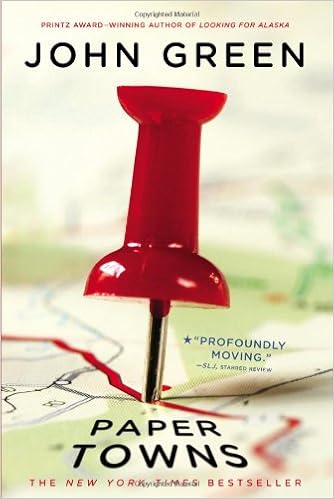 |
| Speak |
John Green
2009
The Summary
"Quentin Jacobsen has spent a lifetime loving the magnificently adventurous Margo Roth Spiegelman from afar. So when she cracks open a window and climbs into his life - dressed like a ninja and plotting an ingenious campaign of revenge - he follows. After their all-nighter ends, and a new day breaks, Q arrives at school to discover that Margo, always an enigma, has now become a mystery. But Q soon learns that there are clues - and they're for him. Urged down a disconnected path, the closer he gets, the less Q sees the girl he thought he knew..."
The Good
I liked Quentin.
Quentin is a good person: he tries his best at school, he has a good group of friends, he has a great relationship with his parents, and he has plans for his future. And I liked him precisely because he is a good person. He's not infallible and he certainly isn't perfect, but he's a good person and he's trying his hardest to be a good friend.
Quentin also has a unique voice. Like all the narrators in John Green's books - Miles from Looking for Alaska, Hazel from The Fault in Our Stars, or Colin in An Abundance of Katherines - Quentin is a gifted storyteller and narrator. Quentin is smart and thoughtful, making connections and finding clues from Margo that no one else managed to find or decipher, and he's an enjoyable narrator. He's intelligent and introspective; he's precise and clear.
Quentin is the type of narrator who manages to ensnare me in his story, precisely because he knows how to tell his story. He knows how to keep me involved in the journey - and I was quickly enthralled.
The Bad
There's a bit of foul language and mature themes, but it's high school. You're bound to confront it eventually.
The Ugly
Margo Roth Spiegelman was a considerable disappointment in Paper Towns. Although my impression of Margo was colored by Quentin's adoration, I had a sinking suspicion she was not the wild, adventurous and amazing girl he - and, well, everyone else - considered her to be.
And I was right.
I know why Quentin had to find Margo: it was a personal journey, a quest for self-discovery. I also know why Quentin had to destroy his image of Margo by finally meeting the real Margo. Margo on paper is different from Margo in real life, and Quentin had to have that misconception destroyed - like us, like the readers.
But finding Margo was a bit anticlimactic. I mean, perhaps I had unrealistic expectations, like Quentin, or perhaps I've been corrupted by traditional literature, which allows for unrealistic expectations. Regardless, I was disappointed.
I understand why John Green did what he did at the end of his novel. I see why he had to destroy Quentin's - and, by proxy, our - expectations for Margo. She became a mirror, reflecting the thoughts and ideas and feelings of all those who knew her (including us), and Green had to shatter that mirror in order for us to see the real Margo.
I get it. I really do.
However, I could have finished Paper Towns without ever finding out what really happened to Margo. It would have spared me the frustration.
No comments:
Post a Comment